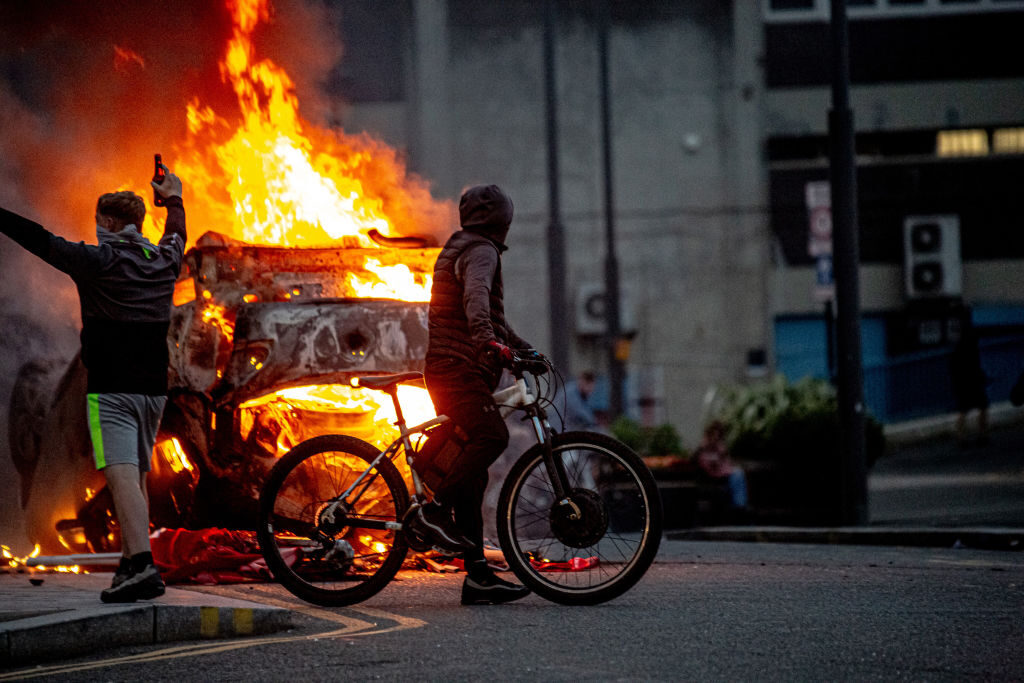With a new report by the Home Affairs Committee concluding that there was no evidence of “two-tier policing” during the Southport riots, the British Government appears unwilling to learn from the violent disorder which unfolded last summer.
The Home Affairs Committee — which includes seven Labour MPs, two Liberal Democrats, and two Conservatives — declared that it was “disgraceful to see the police officers who bore the brunt of this violence being undermined by baseless claims of ‘two-tier policing’”.
During the Southport riots, which occurred in the seaside town after the horrific murder of three young girls last July, Merseyside Police, supported by other Northern forces, stood its ground in the face of violent rioters. It is difficult to convincingly argue that the police response to the riots in Southport, which included an attack on a local mosque, was disproportionate or heavy-handed. Legitimate concerns about two-tier policing rest on how the robust response to the public disorder in Southport compares to forms of riot management in other cases.
For instance, the Harehills disorder in Leeds earlier that same month — which was triggered by the police and social services taking four children belonging to a Romani family into care — saw West Yorkshire Police retreat in the face of violent confrontations with members of the community. Destruction of property included a police car being flipped over and a double-decker bus being set ablaze, along with a huge bonfire of debris which blocked a main road. West Yorkshire Police officers effectively walked away from the situation — a vastly different response from the one which followed the Southport riots.
The Home Affairs Committee report makes only one response to Harehills. It refers to a report by His Majesty’s Inspectorate of Constabulary and Fire and Rescue Services (HMICFRS) which suggested that the Southport disorder could have been “better anticipated” considering the “significant” Harehills riots which took place just a couple of weeks previously. Any serious investigation into two-tier policing in modern Britain would critically examine why there were differences in the policing response between the Southport riots and Harehills disorder, but this new report does no such thing.
Despite its supposed focus on the violent disorder of last summer, the Home Affairs Committee review makes no mention of Birmingham, where two-tier policing was at its starkest. In an interview with Sky News in August, Superintendent Emlyn Richards revealed that his West Midlands Police force consulted “community and business leaders” after rumours that a far-Right English Defence League (EDL) march was organised for the areas of Alum Rock and Bordesley Green, two areas of Birmingham with significant Muslim populations.
This colonial-style approach to policing didn’t pay dividends, with a pub attacked by a mob of young men who were wrongly under the impression that EDL members were inside. Of course, this raises an all-important question: how often do police forces tailor their operations based on the advice of so-called “community figures” in the white-British mainstream when there is a genuine risk of violent disorder?
Other comparisons can be drawn. Following the Hamas attacks on 7 October 2023, Islamist antisemitic chants and the display of pro-terror paraphernalia at pro-Palestine protests in London were severely underpoliced. Would there be such “underpolicing” at a demonstration where anti-Muslim sloganeering and the glorification of proscribed far-Right organisations were taking place? Would the Metropolitan Police entertain an almost-forgiving attitude towards the Notting Hill Carnival — where two people, including a mother who was stabbed in front of her three-year-old daughter, were killed last year — if it were a St George’s Day event primarily attended by white Britons?
The new Home Affairs Committee report, which recklessly dismisses claims of two-tier policing, falls well short of the professional research the issue deserves. It is further proof that the British political establishment is simply unable to face the challenges which are inevitable with an ever-diversifying society, such as the strain that “multicultural governance” can put on community relations. This intervention will only weaken the legitimacy of the British state at a time when its relationship with many of its citizens is beyond repair.











Join the discussion
Join like minded readers that support our journalism by becoming a paid subscriber
To join the discussion in the comments, become a paid subscriber.
Join like minded readers that support our journalism, read unlimited articles and enjoy other subscriber-only benefits.
Subscribe